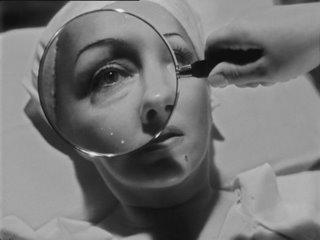
Gloria Swanson (as Norma Desmond) in Sunset Boulevard (1950) - d. Billy Wilder
"What does it mean to think of glamour as a mask? It means apprehending the body beautiful - and especially a beautiful face - as a special, heightened metaphor of the human being who possesses it. Edgar Morin in his 1957 book The Stars once grumbled over the historical tendency that has led us to invest so much in the face - the eyes are the window of the soul, and all that - a tendency given absolute aesthetic form in our rapture before the screen close-up of a gorgeous movie star. Morin's worry is valid: something of the full, earthy body - and that body in motion - is surely lost in those ethereally frozen, twilight moments of the supremely beautiful human face, images wrought from movies into that even more impossibly perfect art of the Hollywood still photographer's glamour portrait.
But there is another way to dream in front of images of glamour. Here's an example: the generation of surrealists who excavated the imagery of popular culture with such passion in the 1950s was also deeply into glamour. Inspired by the aphorisms of Malcolm de Chazal - a visionary philosopher of the human face who saw all the forces and systems of the natural world reflected there - these surrealists grasped beauty not as an objective, frozen commodity, but as a private revelation, an amorous fantasy that must endlessly be recreated in words and homages, dreamed out aloud. The reveries of the surrealists may strike us as rather perverse inversions of conventional beauty codes - Andre Breton, for instance, was given to extolling his wife's 'sexual organs of seaweed and old sweets' - but these reveries were more like mad hallucinations. It is as if everyone, on screen or off, had been touched by the dreamlike magic made possible by the luminous magnifications of the camera lens."
From Glamour: The Confession Of A Mask by Adrian Martin